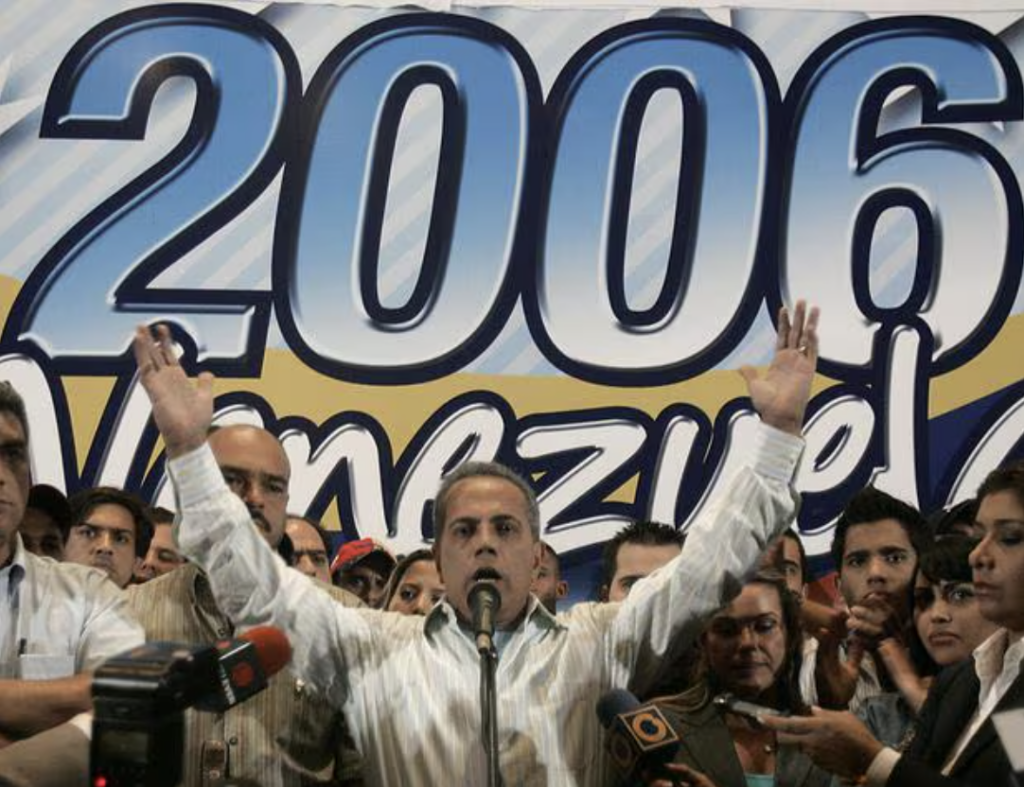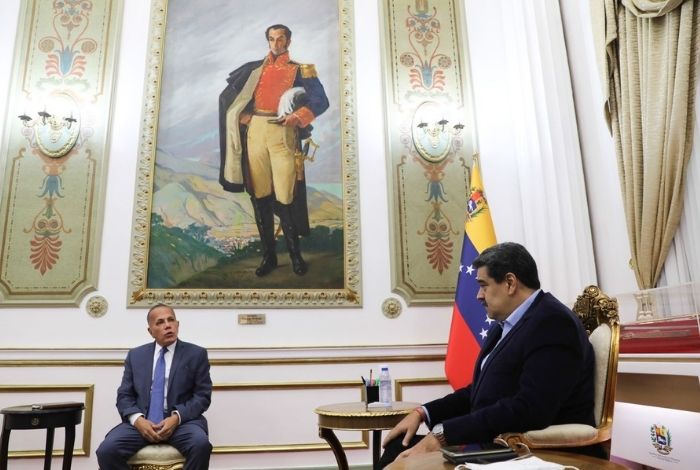Manuel Rosales: A Play in Two Acts – Or Faces
The governor of Zulia seems to expect he’s after the anti-government vote on July 28. But his history rather shows he’s the system’s candidate.


After a wild weekend, and an incredibly stressful Monday, Manuel Rosales is now Un Nuevo Tiempo’s official 2024 presidential candidate – having managed to register his name a few literal seconds before the National Electoral Council’s (CNE) registration deadline expired at midnight and despite his party’s access to the system being supposedly blocked by the CNE until that moment.
On the surface, Rosales’ candidacy seems to resolve a big question that’s bounced around Venezuelan political discourse for months now: why not just vote for someone who isn’t barred from office? Well, it’s not that simple. Any candidate who wishes to beat Nicolás Maduro at the ballot box will need widespread support and Rosales is not only extremely unpopular: he is also a quite polarizing candidate, who’ll have a difficult time uniting the different sectors of the opposition that he’ll need for such a victory. The reason for this is that his recent political career has cast some doubts on the man’s true intentions. Does he even want to beat Maduro?
He’s running for president so, to people unfamiliar with his doings, it seems obvious his goal is to win, but I’d venture many Venezuelans won’t feel the same way, especially if we remember local politics are flooded with alacranes. Let’s look at Manuel Rosales’ political career, a story that can truly be told in two acts, to see why he may inspire distrust among voters from the opposition and other opposition leaders.
Zulian lightning
Manuel Rosales was born 71 years ago in Santa Bárbara del Zulia, a small town in southern Zulia – a populous, historically rich and politically important state in western Venezuela. The man’s political career has been focused almost entirely on making Zulia his stronghold and aligning himself firmly with Zulian cultural identity. While he’s been politically active since a young age, Rosales’ first big win came in 1996 when he began his term as mayor of Maracaibo, Zulia’s capital and one of the country’s biggest cities. The next step from here was the governorship, which he secured in the year 2000, after having lost to Francisco Arias Cárdenas two years before. In 1999, Rosales left Acción Democrática –the dominant party of pre-Chávez Venezuela– and created his own: Un Nuevo Tiempo (UNT).
His first term as governor happened to coincide with the incredibly turbulent rise of Hugo Chávez to the presidency. After just two years as Zulia’s governor, Rosales played a part in the April 2002 ousting of Chávez from Miraflores, signing Pedro Carmona’s infamous decree that suspended all public institutions and concentrated all power in the hands of the president. Rosales’ participation in a coup against Chávez clearly signaled his political allegiances against the rising revolutionary government, something which no doubt played a part in securing him a second term as governor.
Positive public perception of Rosales kept rising, eventually granting him enough leverage to secure –following negotiations with Julio Borges and Teodoro Petkoff– the nomination as the opposition’s sole candidate for the 2006 presidential election.

Following a campaign backed by the different opposition parties and media, under the slogan “Atrévete” which referenced a Calle 13 reggaetón hit in those days, Rosales lost that battle by a considerable margin: winning only over 36% of the vote. Although he accepted defeat, he questioned the “true” size of the gap between him and Chávez – a clear but indirect accusation of election rigging.
But the presidential elections catapulted UNT –while remaining a distinctly Zulian political organization till this day– to become the most voted opposition party in Venezuela by 2008: when it won the governorship of Zulia –with Pablo Pérez now taking the reins from Rosales– and the mayorships of Maracaibo, Ciudad Bolívar and two of the country’s wealthiest municipalities in east Caracas. Rosales would return to the mayorship of Maracaibo.
Now, Chávez perceived Rosales as a legitimate threat, eventually accusing the then-Maracaibo mayor of conspiring against the president and of stealing public funds for nefarious conspiratorial purposes. With the power of the state being wielded against him, Rosales ran from Venezuela and secured political asylum in Peru in 2010. His wife, Eveling Trejo, took over the mayorship.
Rosales had leapt to the forefront of the Venezuelan political scene like a Catatumbo thunderbolt, but just as quickly his career seemed to be cut short by an ever-more-authoritarian government.
That is, until Hugo Chávez died in 2013.
“Die a hero…”
In October 2015, Rosales surprisingly flew back to Venezuela from Peru and was immediately arrested by agents of Venezuela’s National Bolivarian Intelligence Service (SEBIN). His arrest would only last a year though, as he’d be released in December of 2016, a partial result of negotiations between Maduro’s government and the opposition. Rosales’ political rights would also be quickly restored in October 2017 after having been stripped from them following Chávez’s accusations.
This was a rather striking turn of affairs: at this point, Leopoldo López had been arrested for leading protests against Nicolás Maduro’s government, while María Corina Machado’s political rights had been revoked by Venezuela’s Supreme Tribunal of Justice for her alleged “treason.” Henrique Capriles followed suit just a few months later. Rosales sure seemed to be getting some preferential treatment over other major opposition figures.
Doubts over Rosales’ allegiances would deepen further when he announced his candidacy for the upcoming Zulia gubernatorial election just two days after having his political ban lifted (what convenient timing, huh?). These elections were a rerun, as Primero Justicia’s Juan Pablo Guanipa had won the Zulia governorship in October 2017 and he had been stripped of his win for refusing to be sworn in by the illegal and government-controlled National Constituent Assembly that Maduro had just created to crackdown on massive protests and the opposition-controlled National Assembly.
Rosales would be running without the mainstream opposition’s support. While Rosales lost the rerun election in December (and even blamed the opposition for it), he would go on to secure mainstream support in his fifth attempt at the Zulia governorship, which he finally won again in 2021 with an abysmal voter turnout. Nevertheless, he also secured the support of forces that didn’t support the Unitary Platform or even ran against in most states, including Eduardo Fernández’s Unión y Progreso, Antonio Ecarri’s Alianza del Lápiz, MAS, Fuerza Vecinal and even Claudio Fermín’s Soluciones.

Some days after his win, Rosales would visit Nicolás Maduro in Miraflores to discuss their willingness to work together going forward. It was now impossible for Rosales to avoid criticism and accusations of being another alacrán playing the role of toothless opposition for appearance’s sake. Since then, Rosales has maintained a rather cordial relationship with Maduro’s government, hosting a meeting in the governor’s official residence and even “respectfully” recognizing Néstor Reverol as Zulia’s “godfather”, a Maduro-appointed position to (essentially) supervise governors across the country during the presidential elections.
Domestically, Rosales has managed to keep a governorship focused on reestablishing services for Zulians –a sort of spectacular management, like that of Carabobo’s Rafael Lacava— and working hand-in-hand with the Maduro regime on issues like the pollution of Lake Maracaibo. Meanwhile, he has become a vocal critic of sanctions and has rather been focused on criticizing other sectors of the opposition and even the primaries when the process was being organized. He even reinaugurated an Avenue with its old name honoring the Armed Force, ignoring the name it had received in 2017 to honor a student killed in that year’s protests.
If all of this was, somehow, still not enough to make one suspicious of Rosales, he managed to cast further doubt on himself with his registration as candidate for the 2024 elections despite claiming he would avoid running in the the opposition primaries because he didn’t want to “complicate things” and saying he has a “duty to Zulians”. Weird how all of that suddenly changed.
Two-faced inconsistency
And Rosales’ candidacy registration was full of irregularities. If Rosales truly cares about opposition unity, as he’s said in the past, why didn’t he use his party to register Corina Yoris as the opposition’s candidate? Why did UNT suddenly have access to the CNE system after being blocked alongside the MUD card’s access? Why’d he claim he couldn’t register anyone but then showed up to the CNE’s headquarters as his supporters laughed and cheered? Rosales is even acknowledging he is a candidate that somehow overcomes “the obstacles” the government put to the rest of the opposition’s candidates. In his most recent press conference, his followers simply chanted over the journalists who asked these questions. Although Chavismo may be betting on its unpopularity to generate electoral abstentionism among the opposition, it is clear that Rosales has their go-ahead.
Clearly, for most of the opposition it’s really hard to trust Rosales. His actions ever since he returned to Venezuela seem more focused on securing his financial future and conserving his steady stewardship over Zulia than challenging Maduro’s government. His words seem more targeted at legitimizing Maduro as the country’s democratic president instead of organizing any true opposition to his authoritarian rule. Instead of a systemic change, he rather seems comfortable with carving up his own kingdom in the spaces the current PSUV-centered system allows.
Rosales will play an important role in the upcoming election, that much is clear, but it seems likely he’s in this exclusively for himself.
Caracas Chronicles is 100% reader-supported.
We’ve been able to hang on for 22 years in one of the craziest media landscapes in the world. We’ve seen different media outlets in Venezuela (and abroad) closing shop, something we’re looking to avoid at all costs. Your collaboration goes a long way in helping us weather the storm.
Donate




